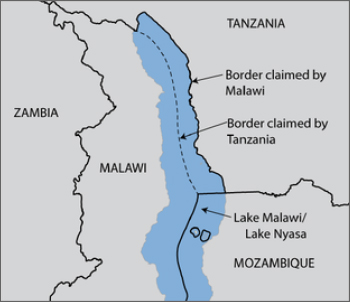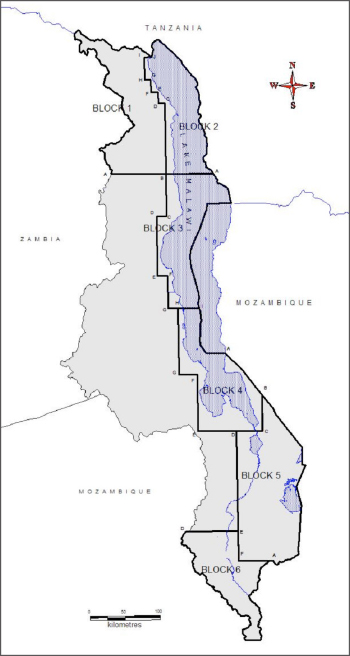Not so peaceful down by this lake – the Tanzania and Malawi lake dispute
Tensions have been flaring between the United Republic of Tanzania (Tanzania) and the Republic of Malawi (Malawi) for the past few years relating to whether the boundary demarcating the respective states’ sovereign territory or territorial waters in respect Lake Malawi or Lake Nyasa as Tanzania refers to it (Lake) runs along the middle of the Lake or along the Lake’s eastern shoreline of the territory of Tanzania.

www.miningmalawi.com and http://www.tzaffairs.org/
The tension escalated in 2011 when Tanzania took exception to the Malawian government’s award of four oil & gas exploration licences in the eastern shoreline of the Lake that Tanzania regards to be within its sovereign jurisdiction. The potential for lucrative revenue streams to be generated from the exploitation of oil & gas resources in this region has further encouraged the dispute.
The central question to be determined is whether Tanzania or Malawi exercise sovereignty over the eastern half of the northern part of the Lake separating Tanzania and Malawi.
This map depicts the blocks awarded by the Malawian government to four multi-national firms (mostly on the north-eastern side of the Lake).
From a legal perspective it appears that Malawi has a legitimate right in asserting its sovereignty along the Lake’s eastern shoreline. The border between Malawi and Tanzania was initially demarcated by colonial powers, Britain and Germany, in terms of the Heligoland Treaty of 1890 (Treaty).
By virtue of the Treaty, customary international law dictates that the default legal position is that the border of Malawi runs along the north-eastern shoreline of the Lake and is, in its entirety, under the sovereign control of Malawi. The onus is on Tanzania to demonstrate that the legal position established by the Treaty was amended to reflect that the border runs along the middle of the Lake and that the shoreline boundary is accordingly incorrect.
From a South African Development Community (SADC) dispute resolution perspective the former presidents of Botswana and Mozambique have been appointed as mediators to resolve the border dispute. In the event that a mediated settlement is not achieved, Malawi or Tanzania could resolve the dispute by international arbitration. Both Malawi and Tanzania are parties to the Statute of the International Court of Justice (ICJ Statute) annexed to the Charter of the United Nations. Article 36 of the ICJ Statute allows states, without first exhausting diplomatic negotiations to refer, among others, cases involving treaty interpretation to the International Court of Justice (ICJ) for arbitration. Tanzania may, however, view any ICJ arbitration as a serious threat, as an arbitral award by the ICJ will extinguish any claim Tanzania has to the Lake. This will most probably encourage Tanzania to rather seek a political solution to the dispute, having regard to the economic benefit flowing from the natural resources (minerals, petroleum, fisheries and so on) of the Lake.
So what does this dispute mean for the multi-national firms who have been awarded exploration licences by Malawi, where Malawi has a clear legal right (if confirmed by the ICJ), but decides to conclude a political settlement with Tanzania on the boundary of the Lake? If a political settlement results in the boundary of the Lake being amended the sovereignty of Malawi in exercising regulatory control over the exploration blocks (specifically blocks two and three) will be extinguished. By virtue of that it means that the right of the exploration licences holders would be extinguished or limited, making the commercial exploitation of the blocks impossible or uneconomical as Tanzanian law will apply to the awarding and exploitation of oil & gas resources within its territory.
Although a political settlement of the Lake dispute would be in the best interest of SADC region, when crafting a political resolution to the dispute parties must be careful not to expose Malawi to potential international arbitration where vested rights of investors are either limited or extinguished as a result of the compromise reached between the two states. Investors who were granted exploration licences may be of the view that they have a legitimate expectation that their rights will not be materially affected or extinguished by any decision by Malawi to conclude a political settlement. For Malawi it appears that any settlement which prejudices vested rights of investors would not be in Malawi’s best interest. The least risky route might be for the ICJ to resolve the dispute through international arbitration.
The information and material published on this website is provided for general purposes only and does not constitute legal advice. We make every effort to ensure that the content is updated regularly and to offer the most current and accurate information. Please consult one of our lawyers on any specific legal problem or matter. We accept no responsibility for any loss or damage, whether direct or consequential, which may arise from reliance on the information contained in these pages. Please refer to our full terms and conditions. Copyright © 2026 Cliffe Dekker Hofmeyr. All rights reserved. For permission to reproduce an article or publication, please contact us cliffedekkerhofmeyr@cdhlegal.com.
Subscribe
We support our clients’ strategic and operational needs by offering innovative, integrated and high quality thought leadership. To stay up to date on the latest legal developments that may potentially impact your business, subscribe to our alerts, seminar and webinar invitations.
Subscribe




